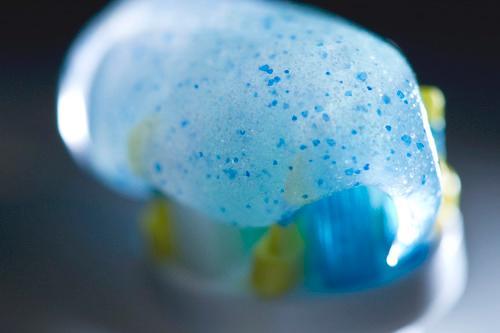Have you seen the recent news about polyethylene microbeads in toothpaste? Several different types of Crest toothpaste, including the Crest ProHealth brand, contain miniature microbeads. Larger microbeads have most frequently appeared in facewashes where they act as an exfoliant; however, there has been a push to have this ingredient banned due to the fact that the polyethylene microbeads are not biodegradable and are building up in water supplies.
When it comes to toothpaste, the microbeads are present as part of the coloring and product design. Recently, there have been reports of the microbeads becoming lodged in the sulcus around the tooth. The sulcus is where the tooth and gums meet and when healthy, measures only 3 mm deep. The reports so far have seemed to come from dental providers who have noticed a small blue pinpoint-sized bead in their patients' gums.
The microbeads are not harmful and have not been causing any patients any pain or discomfort. However, it is possible that patients with inflamed gums who use excessive amounts of toothpaste or practice ineffective brushing techniques might inadvertently build up a presence of these microbeads which could cause further gum problems.
Crest and the ADA stand behind the safety approval ratings that these products acheived when being tested; however, they agree that if the consumer is opposed to toothpaste that contains microbeads, it is best to remove the ingredient from the manufacturing process.
So what now? Well, if desired, you can continue to use your toothpaste as normal. But if the presence of microbeads makes you uncomfortable, then try using another toothpaste for awhile. The Crest products in questions are mainly the Crest Pro-Health, Crest Be, and Crest 3D White toothpaste varieties. Crest makes many other toothpaste options as do other manufacturers.
From a personal standpoint, we have not seen any patients in our office who have exhibited the presence of these microbeads in their gum tissue, but we understand that it is possible and would like to keep our patients informed.
Bottom line, find a toothpaste that you are happy with and make sure that you brush for at least two minutes twice a day and floss daily!



